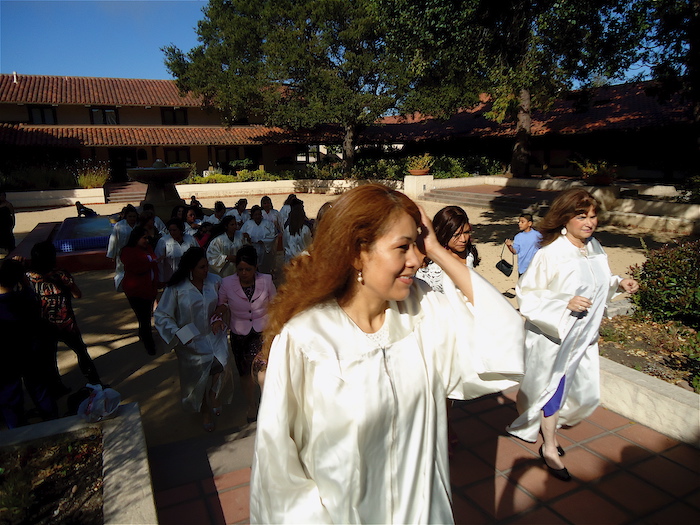
14 Aug Richmond’s Latina Center Supports a Growing Community
News Feature, Edgardo Cervano-Soto
Wearing white caps and gowns, 25 women — ranging from young to middle-aged — pose for photographs in front of a water fountain at San Pablo City Hall. They call their group a sisterhood, born out of a need to speak to others but ultimately enabling them to reach themselves. For most of the women, graduating from the Latina Center’s 2012 Women’s Health and Leadership Program is a milestone, marking two years of involvement with the Richmond-based organization.
“Now, embrace the person next to you!” directs Yenny Velazquez, a program coordinator at the Latina Center. The women joyfully face the classmate beside them and giggle, “Hi, how are you?” and “What’s your name?” as if they were strangers to each other. “Come over here!” they laugh, breaking with formality as they hug like reunited family.
“We have students who received only an elementary education and others that are university graduates and professionals,” says Alejandra Escobedo, who coordinates the Women’s Health and Leadership Program. Yet, she explains, they have two core similarities: “First, these are women that want to progress and will progress. And the other similarity is that upon arriving in this country, they feel anxiety over how to survive in a society completely foreign to them, and (anxiety over) how to contribute and be significant.”
The Latina Center was founded by Miriam Wong in 2002 to serve Richmond’s growing Latina community. Today, the center offers support groups, domestic violence prevention workshops and leadership programs to women in need of healing, empowerment and understanding.
Despite the importance of the work, mental health services like thoseoffered at the center are yet to be fully embraced by the immigrant Latina community. The National Alliance of Mental Health, a policy research non-profit, reports that fewer than 1 in 20 Latino immigrants use mental health services. Breaking through the stigma of treating mental health issues is especially difficult among Latinas, who are 46% more likely than Latino men to experience depression, according to some estimates.
Overcoming the taboo of seeking mental health services, while also trying to build trust and guarantee privacy, is a challenge for mental health providers – but The Latina Center seems to have devised a successful approach. In their model, women can participate in support groups while also being trained as promotoras, or community health leaders. But before they can take part in the leadership trainings, the women must undergo the group process. The Women’s Health and Leadership Program is one of those leadership programs – it is now graduating its 12th class.
The group of 25 line up near the entrance of Maple Hall before entering. They look attentively toward the main room, trying to catch a glimpse of arriving family members. On each table, adorned with deep purple tablecloths, are quotes from the graduates. One reads, “I am a leader who has achieved changes in my neighborhood. I am proud of myself.” The ceremony’s MC, Martha Cuevas, a graduate of the Latina Center’s programs, welcomes the audience and signals to the 25 women to enter the room. They enter, applauded by their community.
————————–
The Women’s Health and Leadership Program is a yearlong program with a new class offered every July. Students are required to devise a community health project, research their topic, conduct a presentation or workshop to peers, and finally execute the project to the proposed audience. This year’s projects included anger management classes, financial literacy workshops and even do-it-yourself cleaning solutions that are ecologically safe. No matter the topic, the program demands research from the students, and the experience has encouraged many graduates to continue community work beyond the program.
Teresa Palafox’s project on co-op business models led to her and some classmates attempting to open a restaurant called Fusíon Latina Restaurant. “More than anything, the program prepared us to initiate the co-op,” says Palafox. “I’ll continue taking classes and attending conferences on how to manage co-op businesses and gain extra income.” Palafox and the other women involved in Fusion Latina Restaurant are now being expertly advised by Arizmendi Bakery co-founder, Terry Baird. “We’ve received a lot of help from different [people],” says Palafox.
The experiences of other graduates have been more internal, but no less life altering. “I am nothing compared to who I was before The Latina Center,” says Maria Gamboa, a middle-aged woman who describes herself as only caring for her family, and always being at home. It was her first time participating in any type of support program.
For her project, Gamboa decided to share her expertise in tailoring by offering free classes to the public. “I discovered many qualities I already had in me,” she says of the process. “I want to continue opening doors to people like me who only care for their children. There is so much more one can do to help their community.”
After receiving their certificates, the class of 2012 welcomed the next class of women, who will begin developing their projects as early as August. The new class includes students not only from Richmond, San Pablo and Contra Costa County, but as far away as Solano and San Joaquin County. There is no other organization like the Latina Center, say the graduates. No other that transforms, with love and friendship.
The Latina Center is located at 3919 Roosevelt Avenue in Richmond. The center accepts walk-ins, and appointments can also be made by phone, at (510) 233-8595






No Comments